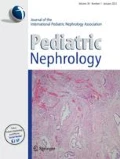Abstract
Acute renal failure (ARF) is a frequent clinical condition in neonatal intensive care units. Plasma creatinine concentrations should be used with some caution for ARF diagnosis in the first days of life. An intravenous fluid challenge allows differentiation of prerenal failure and intrinsic renal failure. All clinical conditions associated with hypovolemia, hypoxemia, and hypotension in the newborn infant may lead to renal insufficiency, the leading causes being perinatal anoxia-ischemia and sepsis. The initial treatment mainly relies on correction of hypotension, acidosis, and hypoxemia, in order to reduce renal vasoconstriction and improve renal perfusion. If necessary, the main renal replacement therapy is usually peritoneal dialysis even if skilled medical and nursing personnel are available in some neonatal intensive care units to perform hemofiltration and hemodiafiltration safely.
Similar content being viewed by others
Author information
Authors and Affiliations
Additional information
Received: 5 March 1999 / Revised: 12 January 2000 / Accepted: 13 January 2000
Rights and permissions
About this article
Cite this article
Gouyon, J., Guignard, J. Management of acute renal failure in newborns. Pediatr Nephrol 14, 1037–1044 (2000). https://doi.org/10.1007/s004670050068
Issue Date:
DOI: https://doi.org/10.1007/s004670050068




